Review: In Prayer for the French Republic, Parisian Jews Consider an Exodus
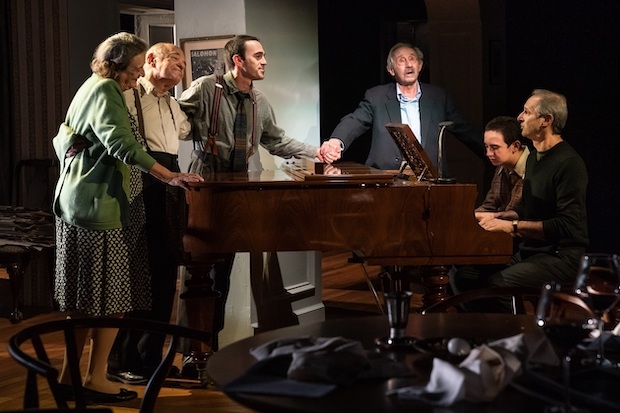
Topol appear in Joshua Harmon's Prayer for the French Republic, directed by David Cromer, for MTC at New York City Center – Stage I.
(© Matthew Murphy)
How do you know when it's time to end a relationship? When does the bad start to outweigh the good? Most of us grapple with these questions as they concern other people, but what about countries? Throughout history, generations of the Salomon-Benhamou family have had to ask those exact questions about the places they have called home: They have prospered in Spain, Algeria, France, and the United States — but as Jews, they have frequently been made to feel unwelcome, sometimes with violence.
That's the subject of Joshua Harmon's Prayer for the French Republic, now making its world premiere with Manhattan Theatre Club at New York City Center. Overflowing with history and timely observations, this important three-act drama mostly takes place in the Paris apartment inhabited by Marcelle (Betsy Aidem), who was born into the Salomon family of piano sellers. She is married to Charles Benhamou (Jeff Seymour), whose family emigrated from Algeria when that country became no longer safe for Jews. Neither is particularly religious, but their son, Daniel (Yair Ben-Dor), has recently started wearing a kippah — a choice that distresses Marcelle.
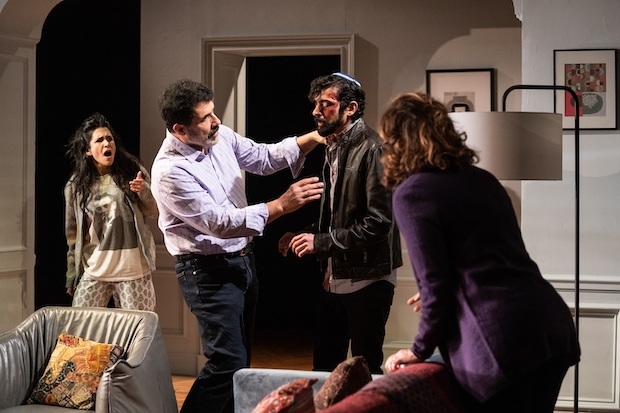
(© Matthew Murphy)
We see why when Daniel makes his first appearance, bloodied from a hate-fueled attack on the streets of Paris. Once a refuge for his parents, France has become an increasingly frightening place for Charles, who wants to move the family to Israel — something Marcelle vehemently opposes. Scenes from the 1940s, when an earlier crop of Salomons (Nancy Robinette, Kenneth Tigar, Ari Brand, and the haunting Peyton Lusk) disastrously chose to stay, shadow the contemporary action. Molly (Molly Ranson), a distant cousin studying in France, witnesses this family drama over the course of several weekends. She is alive only because her ancestors made a difficult decision nearly a century ago: They emigrated to America.
The French Republic, with its laïcité, has a solution to Daniel's problem: Eschew all outward signs of religion and disappear into Frenchness. This is what Marcelle's brother, Patrick (Richard Topol), has done. Their mother was a Catholic, and he doesn't consider himself particularly Jewish. "My family will still be alive in a hundred years," Patrick tells Marcelle in a moment of cruelty. "Will yours?"
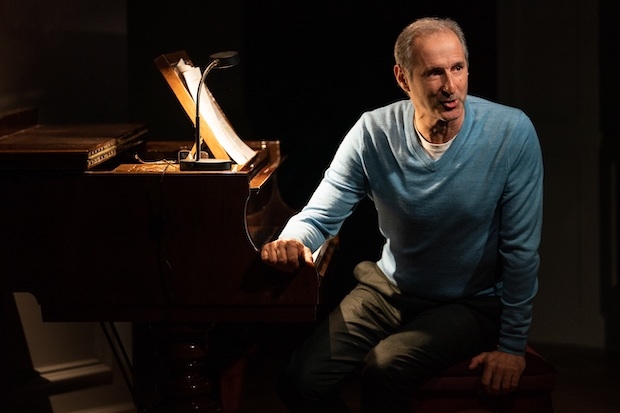
(© Matthew Murphy)
As Patrick, Topol makes a prickly and sarcastic narrator, interjecting bits of family lore as well as gruesome moments of French-Jewish history stretching back to the Crusades. He has forged an authentic brother-sister dynamic with Aidem, whose Marcelle seems to have the ability to steamroll over any opposition with her motherly persistence. That's no small task when she's up against Francis Benhamou, who plays Marcelle's daughter Elodie, giving her second scene-stealing performance of the season (after Selling Kabul). She is tasked with delivering this play's most politically abrasive language, including Harmon's hallmark rant, which is performed here like rhetorical coloratura. The acting is uniformly stellar, topped off by an astounding and emotional third-act performance from Pierre Epstein as the Salomon family patriarch.
Harmon, the writer of Admissions and Bad Jews, has a talent for turning up the heat until his characters reach a boiling point (he is quite good at doing this to the audience as well). Unfortunately, some of the more explosive moments of conflict in Prayer for the French Republic feel forced and unearned, saved only by convincing performances from this cast.
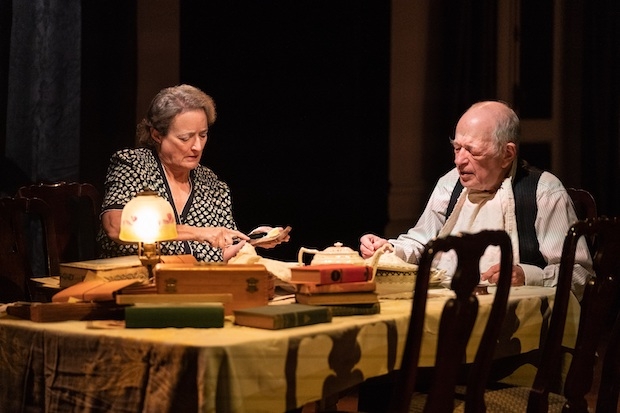
(© Matthew Murphy)
Director David Cromer stages the play with efficiency and ingenuity, so that the past and present seem to inhabit the same space, but on different planes. Sarah Laux's period costumes offer the one major distinction between the 1940s and 2010s (the play is set during the runup to the 2017 French presidential election). Takeshi Kata's rotating set allows for seamless transitions, with a gorgeously polished grand piano acting as the centerpiece of this theatrical lazy Susan.
Few directors say so much with lighting as Cromer, and he has found an ideal collaborator in Amith Chandrashaker, who brings the atmosphere of Paris into the cavernous apartment through diagonals of light and shadow, bathing the flashbacks in the incandescence of memory. Memory is central to Lee Kinney and Daniel Kluger's sound design, which incorporates both emotionally resonant live music and the fuzzy sound of an unforgettable phone call.
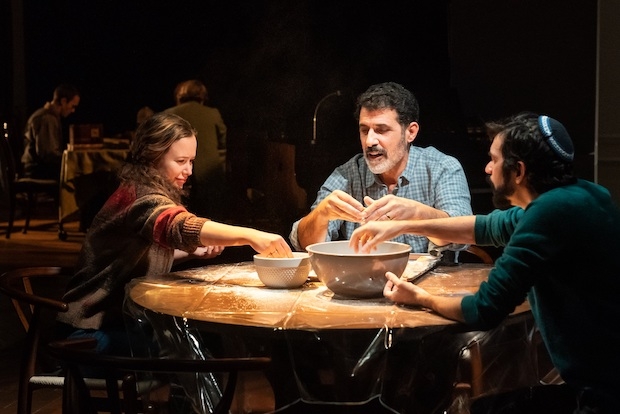
(© Matthew Murphy)
While the production is top-of-the-line, the play itself leaves something to be desired. The drama crackles, but doesn't knock the wind out of you as so many of Harmon's plays have in the past. His restraint is evident early-on, when Marcelle asks Daniel who beat him up, and Charles responds only with a cryptic, "Who do you think," allowing the audience to fill in the blank with their own villain, however politically convenient. Also, much of the characters' hand-wringing about Marine Le Pen (who did not become president) and Donald Trump (who did, but is no longer) cannot help but feel stale from the perspective of 2022 (the length of time it takes to develop plays, and the time-warp created by Covid, makes presenting a timely play like this very difficult right now).
That is too bad, because this is not a stale issue: Fresh evidence of French internment camps is still being discovered, and attacks on Jews in their homes and places of worship are distressingly common — even in the United States. The ancient virus of anti-Semitism is constantly developing new variants, and no one seems to have a solution beyond thoughts and prayers. Harmon doesn't pretend to offer any answers with Prayer for the French Republic, but he does leave us with plenty to think about.











